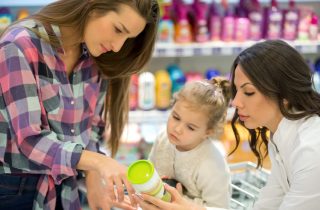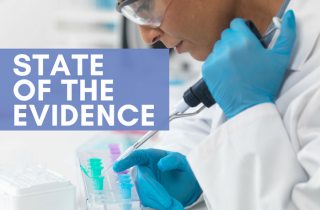Victory! Cleaning Product Ingredient Disclosure
At a Glance
Until now, consumers, workers, and public health agencies have been left to wonder about the presence of allergens, environmental toxicants, and chemicals linked to harmful health effects, like breast cancer, in cleaning products.
On October 15, 2017, California Governor Jerry Brown signed the Cleaning Product Right to Know Act (Senate Bill 258 Lara) into law. This historic legislation makes CA the first state to require the ingredients in cleaning products – particularly chemicals harmful to human health – to be listed on both product labels and online. The tightly-held secret ingredients in fragrance mixtures will also be publicly disclosed, another first for our nation.
This groundbreaking legislation shines a light on toxic chemicals in cleaning products and incentivizes companies to remove them. The result will be safer products for consumers and workers in California and across the country!
We Have the Right to Know the Chemicals in Cleaning Products
Why was this law necessary?
It’s hard to believe in 2017 that cleaning product ingredients are not all already on the label, but unlike food and retail cosmetics, no state or federal law required ingredient transparency for products that we use in our homes and workplaces every day.
Scientific studies and BCPP product testing show that some of the chemicals found in cleaning products can be harmful to our health. These chemicals are linked to both acute health problems – rashes, allergies and respiratory harm– and chronic health concerns like asthma, reproductive and developmental toxicity, and cancer, including breast cancer.
We are exposed to these unsafe chemicals even if we just spend time in places cleaned with them, but especially if we work with them directly, like workers in the cleaning, domestic care and janitorial sectors. And exposures mean these chemicals get into us – studies have detected cleaning product chemicals in urine, breast milk, and blood, including the umbilical cord blood of newborns. It’s what these chemicals do inside our bodies, in combination with other risk factors, that can increase our risk for breast cancer.
Pregnant women, parents with young children, and cancer survivors are among those most concerned about consumer products containing potentially hazardous chemicals. And the right to know is something an overwhelming majority of consumers care about: California public opinion polling showed 78% support among Californians for state-mandated cleaning product ingredient disclosure.
People of color and women are disproportionately impacted by exposures to cleaning products, particularly in the workplace. About half of the nation’s janitors, maids and housekeepers are Latino or African American and women account for 9 out of 10 domestic workers and housekeepers. Exposure to hazardous chemicals in cleaning products is not only a public health issue; it is also a social and environmental justice issue.
What does the law actually do?
The law provides for:
- First-ever mandated disclosure of intentionally added ingredients directly on the cleaning product label, with additional information required on the product website.
- Precedent-setting fragrance ingredient disclosure:
- Full disclosure of a fragrance ingredient listed on any one of 23 authoritative lists of hazardous chemicals.
- Disclosure of all non-hazardous fragrance ingredients present at or above a concentration of 100 parts per million.
- No trade secrets or Confidential Business Information (CBI) protection allowed for intentionally added hazardous ingredients (including fragrance ingredients).
How does knowing what’s in cleaning products help prevent breast cancer?
Transparency in the marketplace is the first vital step toward creating safer products that reduce our exposure to chemicals linked to breast cancer. Ingredient disclosure:
- Allows vulnerable and concerned consumers to make better choices. Breast cancer survivors, and those concerned about their breast cancer risk, will now be able to choose safer cleaning products by avoiding ingredients linked to cancer.
- Gives workers in the domestic services sector information they need to identify problem chemicals and negotiate with their employers for safer products.
- Pressures the industry to stop using hazardous chemicals. Rather than disclose the presence of chemicals linked to cancer, reproductive harm, asthma and other health concerns in their products, manufacturers will switch to safer ingredients.
- Provides environmental health advocates with critical information. BCPP and our partners can use the information about which products and manufacturers use dangerous chemicals to raise public awareness and pressure cleaning product companies to clean up their act.
- Informs state and federal regulators. Knowing which and how many cleaning products contain hazardous chemicals, and therefore how the public is being exposed to those chemicals, gives government agencies the evidence they need to protect public health.
The result is safer products that reduce our risk of breast cancer and other serious health effects
Safer products are particularly important for those workers and communities that bear a disproportionate burden of chemical exposures. These include domestic workers who work with the products daily, janitorial staff in institutions such as schools and hospitals, and communities with high exposure to air and water pollution. Exposures early in life, including prenatal, infant, and childhood, have the highest impact since developing bodies are much more vulnerable to toxic exposures.
How did we get here?
BCPP has worked for nearly a decade to pass laws, both at the state and federal levels, to require cleaning product ingredient disclosure. Throughout, we faced stiff opposition from the cleaning product industry and their trade associations. At the same time though, consumer demand for transparency has exploded, and so manufacturers and retailers have voluntarily upped their game on ingredient disclosure.
When the Lara bill was introduced, several influential trade associations – and their member cleaning product manufacturers – came to BCPP and the other NGOs co-sponsoring SB258 to see if we could find a path forward together to a meaningful, health protective compromise bill. Over the past six months, BCPP and our public health and worker advocate partners engaged in intensive negotiations with some of the state and nation’s leading cleaning product companies. We came to the table with a commitment to find a way forward that would provide consumers and workers with the ingredient disclosure they want and deserve, in a manner that would also be do-able for the cleaning product industry.
The experience was an extraordinary one. Both sides listened and learned from each other, and ultimately crafted a compromise that provides an unprecedented level of cleaning product ingredient disclosure for consumers and workers. This compromise acknowledges the time and resources it will take industry to get there. The resulting compromise garnered praise and support – almost across the board – from domestic workers, to public health and medical organizations, to some of the largest cleaning product companies in the world.
None of this would have been possible without the steadfast and active support of our partner Seventh Generation, the first cleaning product company to offer their customers full ingredient disclosure! Not only has Seventh Gen set the industry standard for full transparency of ingredients in their products, but they also worked shoulder to shoulder with us to get this bill across the finish line! Their expertise, resources, grassroots advocacy, and encouragement have been vital to BCPP’s efforts. Thank you, Seventh Generation!
Where do we go next?
This is an extraordinary win for the right of consumers and workers to have access to information about the chemicals to which they are being exposed to every day. Information allows us to have real choices about the products we choose to buy and use. Yet simply knowing what chemicals are in our products is only the first step. BCPP will use this information to educate people about which chemicals to avoid. We will also pressure cleaning product manufacturers to remove hazardous chemicals from their products.
Our goal is for all cleaning products, in fact all consumer products, to be made with ingredients that are safe for people and our planet. With your support, BCPP will keep moving us toward that goal each and every day!
Support Health-Protective Legislation
BCPP has a proven track record of working effectively with legislators, organizations, and businesses to pass laws that improve our health and safety. Your contributions give us the ability to do this critical policy work!
Types: Blog





